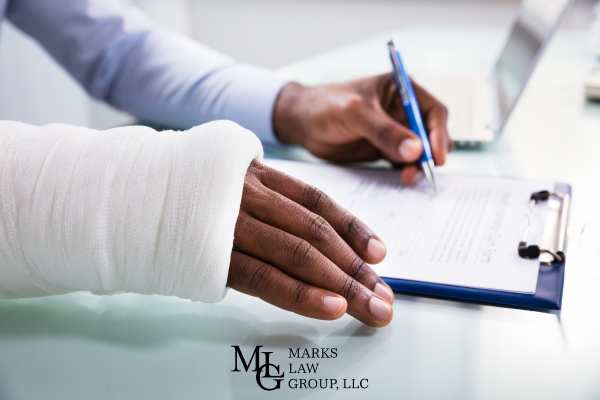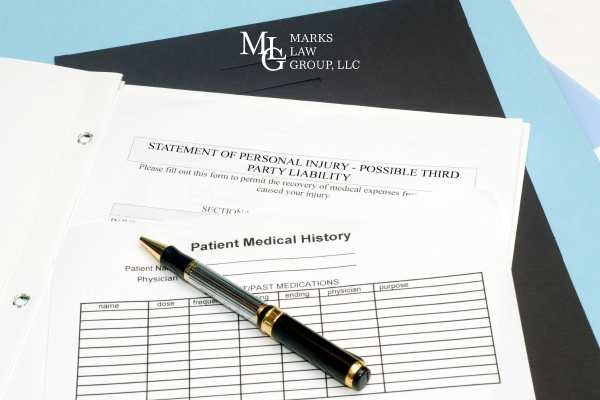Medical records are one of the most important pieces of evidence in any injury claim. They provide a clear, detailed account of your injuries, treatments, and the overall impact on your health and well-being. Whether you’ve been in a car accident or experienced a slip and fall, these records help prove the extent of your injuries, making it easier to secure the compensation you deserve. Without proper documentation, insurance companies may question your claims, making it more difficult to reach a fair settlement.
Ensuring that all medical visits, diagnoses, and treatments are thoroughly documented is essential to building a strong case. Having an attorney review and organize your medical records can significantly improve your chances of a successful claim. If you’ve been injured and need assistance with your injury claim, call an injury attorney in Decatur today at 678-251-9309 to discuss how they can help protect your rights and secure the compensation you're owed.
Establishing the Link Between the Injury and the Incident
Medical records are vital for establishing the link between an injury and the incident that caused it. They serve as primary evidence to prove causation and address any pre-existing conditions that might affect your claim.
Proving Causation
Medical records are essential in demonstrating causation, which is the connection between the incident and the injury. They provide a chronological account of the injury, including when it was first reported and the subsequent medical evaluations and treatments.

For instance, if you were involved in an accident and later experienced specific injuries, the medical records will detail how these injuries were diagnosed and treated immediately after the incident. This documentation helps establish that the injury resulted directly from the incident in question, rather than from an unrelated cause.
Addressing Pre-existing Conditions
Medical records also help to account for pre-existing conditions that might complicate your claim. They include historical health information that can show whether the injury exacerbated a pre-existing condition or if the condition was indeed aggravated by the incident.
For example, if you had a previous back issue and were involved in a car accident that worsened this condition, your medical records will detail the previous state of your health and how the recent incident contributed to the worsening. This helps in accurately assessing the impact of the injury and ensures that your compensation reflects the extent to which the incident affected your overall health.
In summary, medical records are crucial in proving that the injury was caused by the incident and in clarifying the role of any pre-existing conditions. They provide a comprehensive medical history that supports your claim by showing a direct link between the event and the injury, and by addressing how the injury may have interacted with existing health issues.
Documenting the Severity and Extent of Injuries
Medical records play a crucial role in documenting the severity and extent of injuries in an injury claim. They provide a detailed account of the medical treatment you received, starting from the initial diagnosis to follow-up care, surgeries, and rehabilitation. These relevant records include doctors' notes, imaging results, prescriptions, and treatment plans, all of which help outline the progression and seriousness of the injury.
Detailed Accounts of Treatment
By keeping a thorough record of your treatment, medical records demonstrate the seriousness of your injury. They show the timeline of medical visits, the types of treatment you received, and any complications or setbacks you encountered. This level of detail allows for a clear picture of the injury's impact on your health and life, reinforcing the severity of your condition to both insurance companies and the court.
Proving Pain and Suffering
Medical records also support claims for pain and suffering. They often contain descriptions of the pain levels and limitations you experienced during recovery, including the types of medications prescribed for pain management or physical therapy sessions needed to regain mobility.
Consistent documentation of the pain and difficulties you faced helps demonstrate the non-economic damages associated with your injury, such as emotional distress and reduced quality of life.
In summary, medical records not only provide an objective account of the treatment you received but also serve as a key tool in establishing the physical and emotional toll the injury has taken on your life.
Tips for Collecting and Preserving Medical Records for an Injury Claim
Collecting and preserving medical records is crucial for an injury claim. Here are some tips to help ensure you have everything needed:
- Request Records Early: Begin gathering medical records as soon as possible after the injury. Contact every healthcare provider involved in your treatment, including hospitals, specialists, and physical therapists, and request complete records, including test results, imaging, and billing statements.
- Keep Copies of Everything: Maintain a personal file with copies of all your medical documents. This ensures you have backups if any records are misplaced or needed for additional claims or legal actions.
- Organize by Date and Provider: Keep records sorted by date and by the provider to ensure an easy review by your attorney, insurance companies, or medical experts. Clear organization also helps track your medical history related to the injury.
- Preserve Digital Records: If medical records are in digital form, store them securely in a cloud-based service or a secure drive. This protects them from being lost or damaged.
- Document Your Own Experience: Along with medical records, keep a personal journal documenting your recovery, symptoms, and the effects the injury has on your daily life. This provides context and can support the medical evidence.
- Request Billing and Payment Information: Sometimes billing records are separate from medical records, so it’s important to request itemized bills and payments, which demonstrate the financial impact of the injury.
- Verify Accuracy: When reviewing medical records, ensure they are accurate and complete. Discrepancies or missing details can weaken your claim, so flag any mistakes for correction.

By following these tips, you help ensure that your medical records can effectively support your injury claim.
How Your Medical Records Support Your Compensation Claim
Medical records are vital in supporting your compensation claim for an injury. They provide key evidence in calculating damages and strengthening your case with insurance companies.
Calculating Damages
Medical records help document the nature and extent of your injuries, which is critical for calculating damages. Detailed records of doctor visits, diagnostic tests, surgeries, and ongoing treatments allow your attorney or insurance adjuster to determine the total medical costs.
These records also play a role in assessing non-economic damages, such as pain and suffering, by demonstrating the severity and long-term effects of your injury.
Strengthening Your Case for Insurance Companies
Insurance companies often look for ways to minimize payouts, and thorough medical records can counter their attempts to devalue your claim. Comprehensive documentation of your injuries shows the legitimacy of your claim, making it harder for the insurance company to argue that the injury is less severe or unrelated to the incident.
Records like imaging results, doctor's notes, and treatment plans provide objective evidence that validates your injury and the necessary medical care.
Additionally, records of medical expenses demonstrate that you sought prompt treatment, which insurance companies consider when assessing the seriousness of your claim. A clear, consistent medical history reduces the risk of your claim being questioned or denied.
By maintaining organized and accurate medical records, you can effectively support your compensation claim and secure the damages you deserve.
Why Legal Guidance Is Essential for an Injury Claim
Working with a lawyer during an injury claim can significantly enhance your chances of a successful outcome. Here’s why:
- Experience: A lawyer practicing in personal injury cases understands the complexities of the legal system and knows how to navigate it effectively. They can provide guidance on the best course of action, ensure that all legal procedures are followed, and use their experience to build a strong case.
- Accurate Valuation of Your Claim: Determining the true value of an injury claim involves assessing not just immediate medical expenses but also long-term costs, lost wages, and pain and suffering. A lawyer can accurately evaluate your claim’s worth and ensure that you seek appropriate compensation.
- Negotiation Skills: Insurance companies often aim to settle for the lowest amount possible. An experienced lawyer is skilled in negotiation and can advocate on your behalf to secure a fair settlement. They understand how to counter low offers and push for the compensation you deserve.
- Gathering Evidence: Building a strong case requires thorough evidence gathering, including medical records, witness statements, and expert testimonies. A lawyer has the resources and knowledge to collect and organize this evidence effectively, ensuring that your case is well-supported.
- Handling Legal Procedures: The legal process for an injury claim involves filing paperwork, meeting deadlines, and adhering to procedural rules. A lawyer can handle all these tasks, reducing the stress and complexity for you. They ensure that all documents are correctly filed and that you comply with all legal requirements.
- Representation in Court: If your case goes to trial, having a lawyer means you have professional representation. They can present your case in court, argue on your behalf, and use their knowledge to handle complex legal arguments and procedures.
- Peace of Mind: Dealing with an injury claim can be overwhelming, especially when recovering from an injury. Having a lawyer manage your claim allows you to focus on your recovery while knowing that your legal interests are being handled professionally.

In summary, working with a lawyer provides guidance, ensures fair compensation, and handles the complexities of your injury claim, ultimately increasing your chances of a successful resolution.
How Long Should I Keep My Medical Records for an Injury Claim?
For a personal injury claim, it is advisable to keep your medical records for an extended period, ideally until the claim is fully resolved and beyond. Here’s why:
- Duration of the Claim Process: Personal injury claims can take time to settle, sometimes extending over several months or even years. Keeping your medical records for the entire duration of the claim ensures that you have all necessary documentation if further information is requested or if complications arise.
- Potential Appeals or Additional Claims: Even after your initial claim is settled, there may be possibilities for appeals or additional claims, especially if new symptoms develop or complications arise from the original injury. Retaining your medical records ensures that you have a complete history available for any future legal or insurance proceedings.
- Future Medical Issues: Injuries from an accident might have long-term effects that could require future medical treatment. Keeping records allows you to track any ongoing issues and provide historical evidence if needed for future claims or evaluations.
- Legal and Insurance Requirements: In some cases, insurance companies or legal entities may request access to your medical records long after the initial claim. Having a comprehensive record available can help you respond promptly to such requests.
In general, it’s prudent to keep your medical records for at least 5 to 7 years after the final settlement of your claim, or even longer if advised by your attorney. This ensures that you are well-prepared for any future needs related to your injury and can provide a complete history if required.
Need to Strengthen Your Injury Claim? Contact Us for Legal Guidance
Medical records play a crucial role in proving the extent of your injuries and the impact they’ve had on your life. Without detailed documentation, it can be difficult to secure the compensation you deserve. Ensuring your medical records are accurate and comprehensive is key to building a strong injury claim.
If you’ve been injured, contact a personal injury attorney today to help gather the necessary evidence, including your medical records, to strengthen your case and fight for the compensation you're entitled to.
